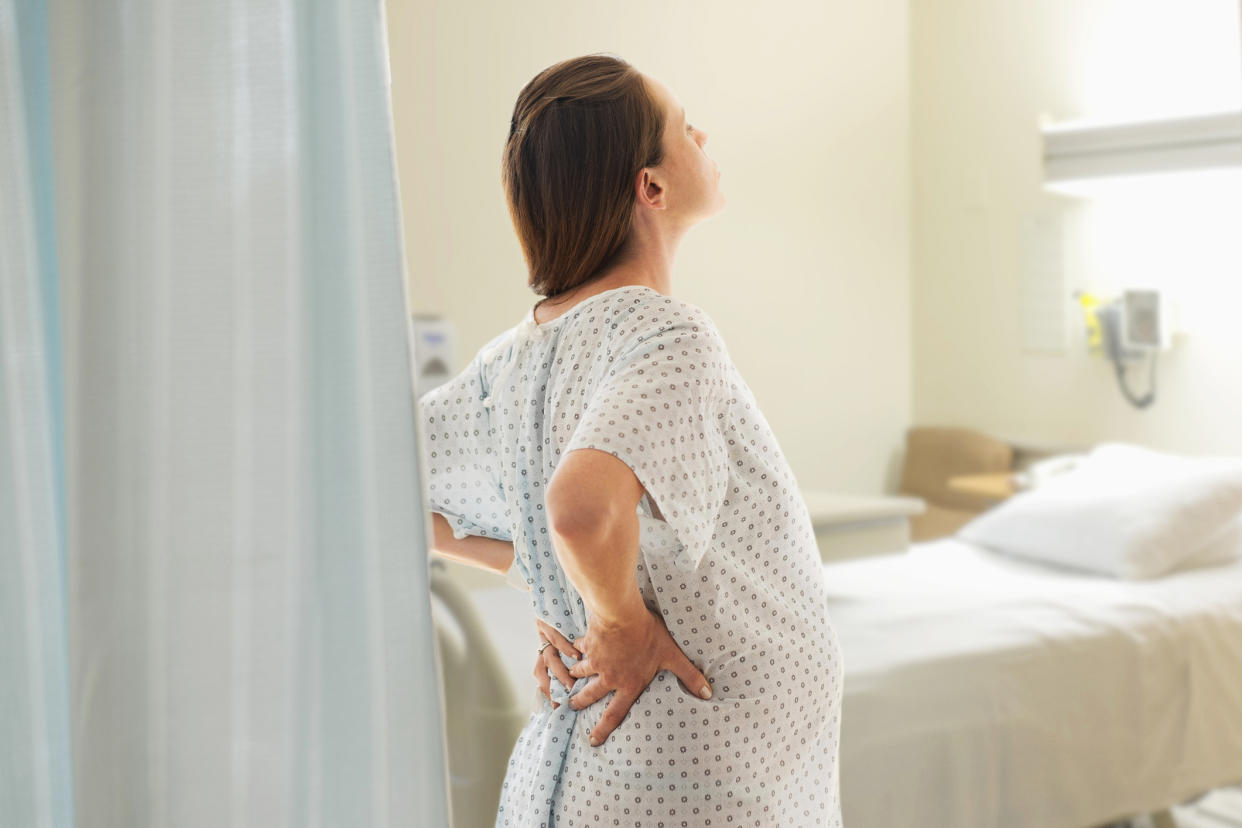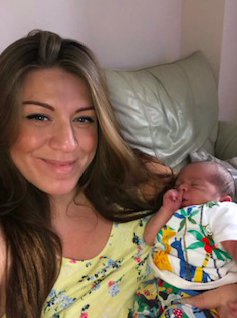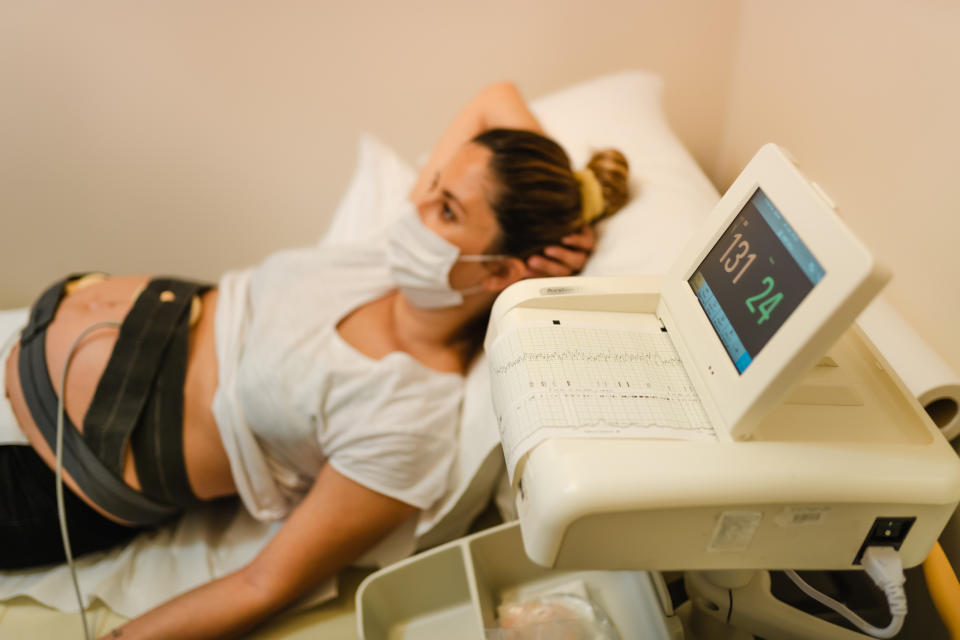Women share stories of going through labour alone as petition calls for change to birth partner restrictions

Women have been sharing their “traumatic” experiences of being in labour without their partner by their side, after a petition was launched calling for a change to social distancing rules on maternity wards.
The measures, designed to help reduce the spread of coronavirus, mean many hospitals in England are only allowing birthing partners to be present when the expectant mother is in “established labour” (4cm or more dilated).
The restrictions also mean many birth partners are not permitted to attend antenatal scans and appointments and are asked to leave the hospital shortly after the baby is born.
The petition, launched by Holly Avis, 35, a homemaker from Rushden, is calling for the restrictions to change to allow a chosen birth partner to be in attendance from the very start of labour until the new mum is allowed to go home, and for the birth partner to also be allowed to attend scans and appointments.
Avis was prompted to start the petition after spotting a photo shared on social media showing her local Primark reopening with a queue of a couple of hundred people.
“At first I just thought ‘I’m glad I’m not queuing in that’, then it dawned on me, I could go shopping with my partner and children with zero PPE (not that I would want to) but that same partner I live with wasn’t allowed in for much at all of the birth of his child, even if he tested negative for COVID-19 and was wearing PPE,” she told Yahoo UK.
“I immediately felt a huge injustice and sadness and knew something had to be done.”
Read more: Woman who endured 18 miscarriages and 16 years of IVF shares how she finally became a mum

Avis argues the current measures risk partners missing the birth of their babies, as labour can be unpredictable.
Additionally, should a woman experience complications, Avis says they risk the prospect of facing traumatic moments alone, without the support of a birth partner.
On the petition page, Avis goes on to say it seems unfair that social distancing measures have been relaxed in other settings, such as in pubs and restaurants, but not in maternity units.
Read more: Nurse gives birth in car as husband drives them to hospital at 70mph
Avis says not being able to have her partner with her for various stages of pregnancy really affected her.
“My partner only made it to my very first scan and from then on he missed all further scans and appointments,” she said.
“In the end the anxiety I was facing at the thought of birthing even partially alone made me change my birth plan entirely from a planned Caesarean section to a home birth.”

Since launching the petition, Avis has received hundreds of messages from mothers and their partners with heartbreaking stories about how the measures have impacted them.
“All of them are anxious not to experience appointments, scans and labour alone but they’ve also shared real experiences where partners are genuinely missing births, either due to mis-assessing or labour progressing faster than predicted,” she said.
“Many cases where babies have actually passed away and the mother is alone for that news in her scan or even a stillbirth.
“The most heartbreaking story came to me last night from a mother whose baby had sadly died, and she was called into hospital to be induced to birth the baby, and her partner was still not allowed with her.
“The induction was three days in length and she had to go through all of that alone, to leave hospital at the end without a baby.”
Avis says she has been blown away by the response to the petition.
“Initially I thought I might gather a hundred signatures at best,” she said.
But the petition now has more than 300,000 signatures after being promoted by the #ButNotMaternity campaign, set up by Birthbliss Academy, which aims to support the birthing rights of all women and pregnant people.
Having teamed up with Avis, they have written an open letter to Professor Whitty, Matt Hancock and NHS England to explain their concerns about the current restrictions on partners attending scans and appointments.
Dear @MattHancock can you please explain to us why it is not okay for a partner to attend scan appointments and early labour, but it is okay for people to drink in pubs? Could it be that pregnant women have been ignored and forgotten? #pregnancysupport
— PregnantThenScrewed (@PregnantScrewed) September 5, 2020
Read more: Birth expert shares top tips on how to get through first 12 weeks of pregnancy
The petition is being widely shared on social media where women are also sharing their own stories of how they have been impacted by the restrictions.
This needs to be addressed immediately by the government.
I gave birth by myself & my husband didn’t see our baby until she was 3 days old. Giving birth alone was the most traumatic experience of my life. We must do better by those giving birth during this time #ButNotMaternity pic.twitter.com/h1W5lg7Ehy— Tobi Oredein (@IamTobiOredein) September 5, 2020
Absolutely disgusted that restrictions have not been lifted for maternity services within the NHS. My husband has been deprived of scans, visits, consultation meetings etc and this still continues! I have personally found this mentally and emotionally draining. #butnotmaternity pic.twitter.com/BBPnsk4SLY
— Shauna McNamee (Rafferty) (@shaunamarieraff) September 4, 2020
Trust me, as a pregnant woman at the moment, this situation is rubbish. ☹️ My boyfriend has missed all 6 of my scans so far (had to have extra due to health complications) & won’t be able to come to my growth scan next week either. #butnotmaternity pic.twitter.com/WjOeFeF1fK
— Dollymarie (@DoIIymarie) September 4, 2020
I had to go into hospital alone when in active labour. Husband couldn’t come in until I was examined and confirmed to be in active labour. It was very hard,had to wear a mask initially too. Really feel for women who are in labour for the first time, it was my 3rd child so easier.
— Jenny Smith (@JenniferAnneSm6) September 6, 2020
This happened to my friends daughter. First child, pre-eclampsia and her boyfriend had to sit outside in the car until she was in active labour! We kept in touch with her via WhatsApp until her boyfriend was allowed in.
— Ruth Tudor (@AuntyOof) September 6, 2020
Read more: Woman has surprise baby after thinking weight gain during lockdown was due to snacking
Avis hopes that encouraging women to share their stories on social media, will help persuade authorities to change the guidance.
“It simply must be recognised that birth partners are NOT the same as visitors and therefore should not be treated as so,” Avis added.
“With PPE and testing readily available there’s no reason why partners can not be with mothers now and we also need to think about the detrimental effect this is having on mental health, which is just as important to protect as any other illness or condition.”
The Royal College of Midwives (RCM) and the Royal College of Obstetricians and Gynaecologists have described the delay by NHS England in publishing guidance on partners attending births, scans and other ante- and postnatal appointments as “unacceptable”.
“Not only is this causing distress to pregnant women and their families, it is also impacting on our members, some of whom have faced abuse from visitors unable to attend appointments,” said RCM CEO Gill Walton.
“We recognise that there is the need to vary local rules depending on circumstances, such as staffing levels and locally-imposed restrictions due to rising levels of COVID, but we urge NHS England to stop the delay and publish the guidance for all concerned.”
A spokesperson for the NHS told Yahoo UK: “The safety of our patients and their families is always the absolute priority, which is why guidance on safely attending maternity appointments was developed at the start of the pandemic with the Royal Colleges of Midwives and Obstetricians and Gynaecologists.
“Now as we have moved past the initial peak, the NHS is continuing to work with frontline professionals and patient groups to open up services safely, and allow partners to go to antenatal clinics, in addition to being present for labour, which partners have been able to do throughout the pandemic.”




